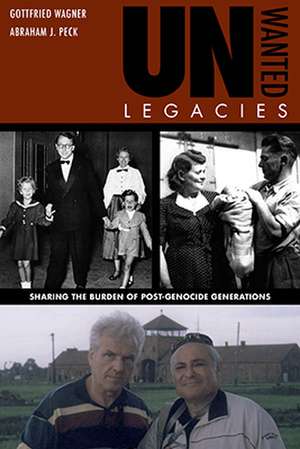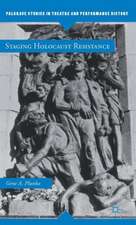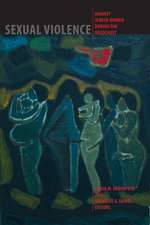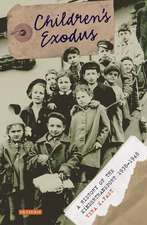Unwanted Legacies: Sharing the Burden of Post-Genocide Generations: Modern Jewish History
Autor Gottfried Wagner, Abraham J. Pecken Limba Engleză Paperback – 24 mar 2014
How does a society reconcile itself in a post-genocide era? How can generations of those whose families were victims and victimizers break the cycle of hate, mistrust, shame, and guilt that characterizes their relationship? What family reactions do they face as they seek to begin the act of sitting across from each other and facing their legacies?
For more than two decades, Gottfried Wagner, great-grandson of composer Richard Wagner, whose music inspired Adolf Hitler and whose family helped the Nazis rise to power, and Abraham J. Peck, the son of two survivors whose entire families were murdered in the Holocaust, have been engaged in a unique and often torturous discussion on the German-Jewish relationship after the Shoah. That discussion has focused on their family histories and on the myths and realities of the relationship between Germans and Jews since the beginning of the nineteenth century and the process of reshaping that relationship for those Germans and Jews born after 1945. Rejecting the notion that they are either victims or perpetrators, both authors examine the “unwanted legacies” they inherited and have had to confront and overcome.
For more than two decades, Gottfried Wagner, great-grandson of composer Richard Wagner, whose music inspired Adolf Hitler and whose family helped the Nazis rise to power, and Abraham J. Peck, the son of two survivors whose entire families were murdered in the Holocaust, have been engaged in a unique and often torturous discussion on the German-Jewish relationship after the Shoah. That discussion has focused on their family histories and on the myths and realities of the relationship between Germans and Jews since the beginning of the nineteenth century and the process of reshaping that relationship for those Germans and Jews born after 1945. Rejecting the notion that they are either victims or perpetrators, both authors examine the “unwanted legacies” they inherited and have had to confront and overcome.
| Toate formatele și edițiile | Preț | Express |
|---|---|---|
| Paperback (1) | 235.55 lei 3-5 săpt. | |
| Texas Tech University Press – 24 mar 2014 | 235.55 lei 3-5 săpt. | |
| Hardback (1) | 516.19 lei 6-8 săpt. | |
| Texas Tech University Press – 24 mar 2014 | 516.19 lei 6-8 săpt. |
Din seria Modern Jewish History
-
 Preț: 213.12 lei
Preț: 213.12 lei -
 Preț: 234.03 lei
Preț: 234.03 lei -
 Preț: 302.22 lei
Preț: 302.22 lei -
 Preț: 133.80 lei
Preț: 133.80 lei -
 Preț: 290.10 lei
Preț: 290.10 lei -
 Preț: 164.76 lei
Preț: 164.76 lei -
 Preț: 169.28 lei
Preț: 169.28 lei -
 Preț: 245.04 lei
Preț: 245.04 lei -
 Preț: 256.17 lei
Preț: 256.17 lei -
 Preț: 116.50 lei
Preț: 116.50 lei -
 Preț: 210.44 lei
Preț: 210.44 lei -
 Preț: 253.07 lei
Preț: 253.07 lei -
 Preț: 137.54 lei
Preț: 137.54 lei -
 Preț: 155.86 lei
Preț: 155.86 lei -
 Preț: 211.05 lei
Preț: 211.05 lei -
 Preț: 235.26 lei
Preț: 235.26 lei -
 Preț: 239.67 lei
Preț: 239.67 lei -
 Preț: 205.44 lei
Preț: 205.44 lei -
 Preț: 418.07 lei
Preț: 418.07 lei -
 Preț: 225.91 lei
Preț: 225.91 lei - 20%
 Preț: 231.42 lei
Preț: 231.42 lei
Preț: 235.55 lei
Nou
Puncte Express: 353
Preț estimativ în valută:
45.07€ • 47.06$ • 37.30£
45.07€ • 47.06$ • 37.30£
Carte disponibilă
Livrare economică 14-28 martie
Preluare comenzi: 021 569.72.76
Specificații
ISBN-13: 9780896728356
ISBN-10: 0896728358
Pagini: 432
Ilustrații: 50
Dimensiuni: 152 x 229 x 33 mm
Greutate: 0.69 kg
Ediția:1
Editura: Texas Tech University Press
Colecția Texas Tech University Press
Seria Modern Jewish History
ISBN-10: 0896728358
Pagini: 432
Ilustrații: 50
Dimensiuni: 152 x 229 x 33 mm
Greutate: 0.69 kg
Ediția:1
Editura: Texas Tech University Press
Colecția Texas Tech University Press
Seria Modern Jewish History
Recenzii
This discussion is nothing less than the coming together of different poles in the common quest for understanding. It is a masterful dual meditation on the evils men can do and how they can be overcome. —Paul R. Bartrop, director, Center for Judaic, Holocaust, and Genocide Studies, Florida Gulf Coast University
Gottfried Wagner and Abraham Peck, despite diametrically opposite backgrounds, have joined forces to provide a roadmap of understanding for succeeding generations. Their biographies alone, which dig deeply into Nazism and the pain of the Holocaust, make Unwanted Legacies must reading. —Eugene DuBow, founding director, Berlin Office – Ramer Institute, The American Jewish Committee
Unwanted Legacies, important in its own right, is a positive and hopeful starting point for all who wish to engage in meaningful dialogue with “the other.” Ideally, it will?indeed, it must?be read widely and discussed even more. ?Steven Leonard Jacobs, Aaron Aronov Endowed Chair of Judaic Studies, The University of Alabama
This sensitively written book demonstrates conclusively that racial, religious, or ethnic prejudice is never genetic, and that any post-Holocaust German-Jewish reconciliation must be predicated on the absolute rejection of fanaticism and bigotry. —Menachem Z. Rosensaft, adjunct professor of law, Cornell Law School; lecturer in law, Columbia Law School
Gottfried Wagner and Abraham Peck, despite diametrically opposite backgrounds, have joined forces to provide a roadmap of understanding for succeeding generations. Their biographies alone, which dig deeply into Nazism and the pain of the Holocaust, make Unwanted Legacies must reading. —Eugene DuBow, founding director, Berlin Office – Ramer Institute, The American Jewish Committee
Unwanted Legacies, important in its own right, is a positive and hopeful starting point for all who wish to engage in meaningful dialogue with “the other.” Ideally, it will?indeed, it must?be read widely and discussed even more. ?Steven Leonard Jacobs, Aaron Aronov Endowed Chair of Judaic Studies, The University of Alabama
This sensitively written book demonstrates conclusively that racial, religious, or ethnic prejudice is never genetic, and that any post-Holocaust German-Jewish reconciliation must be predicated on the absolute rejection of fanaticism and bigotry. —Menachem Z. Rosensaft, adjunct professor of law, Cornell Law School; lecturer in law, Columbia Law School
Notă biografică
Gottfried Wagner studied musicology, philosophy, and German philology in Germany and Austria. He works internationally as a music historian and multimedia director. He has lived in Italy since 1983.
Abraham J. Peck is the executive director of the Center for Catholic-Jewish Studies and professor in the department of history at Saint Leo University outside Tampa, Florida. He is the author of fourteen other books on the Holocaust and Judaism.
Abraham J. Peck is the executive director of the Center for Catholic-Jewish Studies and professor in the department of history at Saint Leo University outside Tampa, Florida. He is the author of fourteen other books on the Holocaust and Judaism.
Descriere
A dialogue devoted to remembering genocide’s past and preventing its future













